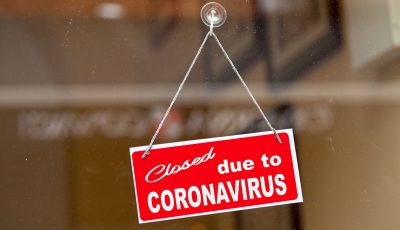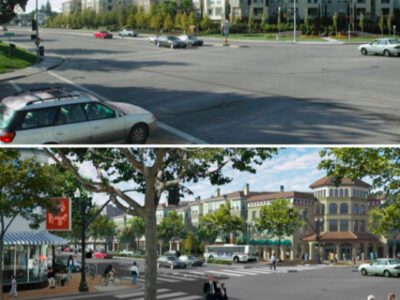Do Epidemic-Based Business Closures by Government Trigger an Unconstitutional “Taking”?
Longstanding U.S. Supreme Court Precedents Indicate the Answer is an Unequivocal “No”

Lately, an increasing number of public and private voices have been raised in opposition to business closures ordered by state and local governments in response to the COVID-19 epidemic. In many such cases, that opposition has taken the form of lawsuits filed by business owners, claiming a violation of their constitutional rights. Gun shops across the country, for example, have sued to reopen their businesses, claiming that government closure orders contravene the Second Amendment-based right to bear arms.
Indeed, the epidemic has seemingly launched a whole new legal practice area: coronavirus lawsuits. In California, San Francisco attorney Harmeet Dhillon has emerged as the apparent queen of COVID-19 litigation, seemingly ready to bring any number of lawsuits against state and local governments on behalf of business interests based on a multitude of constitutional theories.
One of the most prevalent such claims is that government-mandated closures of private businesses violate the latter’s private property rights protected under the Fifth Amendment’s “Takings Clause”; business owners assert they’re therefore entitled to financial compensation from the state or local governments. Small business owners in Pennsylvania, for example, have relied on the Takings Clause to sue that state’s Governor, Tom Wolf, who in March ordered the closure of non-essential Pennsylvania businesses based on public health concerns arising from the epidemic. In California, the aforementioned Ms. Dhillon recently brought a lawsuit on behalf of retail business owners against Governor Gavin Newsom, Los Angeles Mayor Eric Garcetti and other government leaders, alleging that their shelter-in-place orders violate the owners’ constitutionally-protected property rights and trigger a compensable, “regulatory taking” of their businesses.
How likely are these takings lawsuits to prevail? The answer: not likely at all.
Recently, U.C. Berkeley School of Law Dean and constitutional scholar Erwin Chemerinsky gave a presentation to a group of federal and state court judges regarding epidemic-related constitutional issues, and the likelihood that lawsuits raising such constitutional claims would be successful. Takings Clause-based claims were one category of constitutional challenges Dean Chemerinsky analyzed and ultimately dismissed. He cited a pair of Korean War-era U.S. Supreme Court decisions that had rejected Takings Clause-based challenges to the federal government’s seizure and redeployment of private factories to assist the war effort.
I agree with Dean Chemerinsky that Takings Clause-based lawsuits challenging business closures in the face of the current epidemic are quite likely without legal merit. And I offer some additional thoughts on the subject:
Another so-called “possessory takings” case that courts might well find relevant to their disposition of epidemic-based business closure cases is the California Supreme Court’s 1995 decision in Customer Company v. City of Sacramento. In that case, an armed robbery suspect took refuge in a convenience store when the local law enforcement arrived, and refused to surrender. Police fired tear gas into the store, which had the desired effect of disabling the robber and allowing his capture. But in the process substantial damage was done to the foodstuffs and other inventory of the store. The Supreme Court rejected the store owner’s lawsuit claiming that the law enforcement response triggered a requirement to pay the owner compensation under the Takings Clause for its economic losses. Said the court: “just compensation has…never been applied to require a public entity to compensate a property owner for property damaged resulting from the efforts of law enforcement officers to enforce criminal laws.” The analogy to a severe public health emergency seems persuasive, at least to this observer.
Even more instructive are past takings claims arising out of government efforts to prevent the spread of disease. Nearly a century ago, for example, the U.S. Supreme Court unanimously held in Miller v. Schoene that the Takings Clause did not require the State of Virginia to compensate the owner of cedar trees for the value of the trees that the state ordered destroyed to prevent a disease from spreading to nearby apple orchards that were vital to the regional economy.
However, I believe that even more apt–and dispositive–are property rights cases that don’t concern government possession or physical destruction of private property but, rather, involve government regulation of private property interests. In general, government defendants in such “regulatory takings” cases tend to prevail far more often than in the possessory takings disputes summarized above.
The logical starting point is the Supreme Court’s iconic 1978 decision in Penn Central Transportation Co. v. City of New York–the Court’s single most important regulatory takings case. In rejecting a developer’s challenge to New York City’s historic preservation law, the justices articulated the criteria it indicated courts should apply in deciding such regulatory takings claims. One key factor, according to the Court, is the “character of the governmental action.” Here, of course, state and local governments’ closure of non-essential businesses is designed to stem the rampant coronavirus epidemic–literally a matter of life and death. Courts are likely to–and should–afford government regulators substantial deference given the “character of the governmental action” they are taking to halt the epidemic.
But the single most apposite U.S. Supreme Court ruling in the present context is likely the Court’s 2002 decision in Tahoe-Sierra Preservation Council v. Tahoe Regional Planning Agency. There, private property owners challenged a 32-month moratorium that the bistate Tahoe Regional Planning Agency had imposed to allow it time to formulate a comprehensive regional plan for the Lake Tahoe Basin (as required by a bistate compact reached between California and Nevada). Even though the moratorium temporarily prevented the affected private owners from making economic use of their property, the Court rejected their “temporary takings” lawsuit, concluding that TRPA had acted reasonably under the circumstances and noting that the property owners were able to regain the economic use of their property after the moratorium ended.
If the Supreme Court was persuaded in Tahoe-Sierra that a temporary elimination of property owners’ ability to exploit their economic interests was justified in order to promote important natural resource concerns–albeit in the spectacular environmental setting provided by the Lake Tahoe Basin–I submit that the current COVID-19 public health emergency presents an even more compelling case for government intervention.
In sum, Takings Clause-based legal challenges to government-mandated business closures designed to combat the unprecedented public health threat posed by the coronavirus are likely to fail. As well they should.
Meanwhile, the Wall Street Journal and other media outlets are reporting that the U.S. Chamber of Commerce and many of the same business interests that are mounting these Takings Clause-based lawsuits are lobbying for Congressional immunity from any third-party legal liability when they’re allowed to reopen their businesses. Stated differently, they claim a constitutional right to reopen regardless of the public health consequences of doing so, while at the same time seeking to insulate themselves from any legal responsibility to the public for those same consequences.
To quote author Kurt Vonnegut, one of the 20th century’s most incisive social observers: and so it goes…






Reader Comments